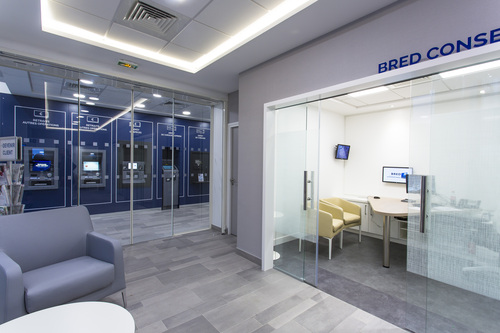Plus de temps consacré aux clients
Après avoir constaté une fréquentation en baisse dans tous les réseaux, la BRED, dont la maison-mère est le groupe BPCE, a décidé de pérenniser le système mis au point pendant le confinement et de le généraliser à ses 350 agences. Cela signifie que les clients ne pourront plus entrer en agence pour rencontrer un conseiller. Effectivement, pour y pénétrer, ils devront avoir pris rendez-vous préalablement par téléphone ou via l’application mobile de la banque.
Ce mode d’organisation est testé depuis 2019 dans certaines agences et a été étendu à l’ensemble des établissements avec la pandémie de Covid-19. Malgré les restrictions qui y sont associées, la BRED semble y trouver son compte puisque son activité a progressé de 4 % sur les 9 premiers mois de l’année.
Selon la BRED, ce système permet de consacrer plus de temps aux clients lors des rendez-vous, qu’ils aient lieu sur place ou par téléphone. « Car la demande de conseil et de disponibilité demeure, elle est même plus exigeante qu’avant », explique Olivier Klein, le directeur général de la BRED, au journal Les Echos.
Pas de fermetures d’agences
Les banques européennes sont confrontées à des défis supplémentaires en matière de rentabilité en raison des retombées économiques de la crise du coronavirus. Après avoir annoncé début novembre un projet de suppression de 640 postes, Société Générale a affirmé le 7 décembre dernier vouloir fusionner ses réseaux de détail avec ceux du Crédit du Nord, ce qui se traduira par la fermeture de 600 agences. De manière générale, en Europe, les annonces de réductions d’effectifs se sont multipliées ces dernières semaines.
La BRED n’a toutefois pas prévu de fermer ses points de vente. La direction assure que la conversion à ce nouveau modèle 100 % rendez-vous n’aura pas d’impact sur le nombre de sites et leurs emplacements.
Miser sur la valeur ajoutée
Pour faire la différence sur un marché où la concurrence est particulièrement rude, la BRED mise sur la valeur ajoutée. Cela passe par des investissements dans le numérique, une nouvelle organisation du travail, mais aussi une hausse du budget formation afin de faire monter en compétences les conseillers. Cette stratégie semble porter ses fruits puisqu’en 2019 la banque a vu ses revenus augmenter de 5,1 %, à 1,25 milliard d’euros. Reste à savoir si le constat sera le même sur le long terme.
